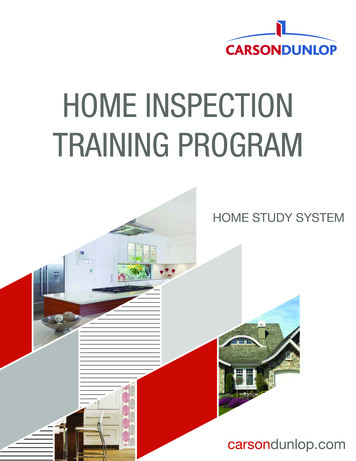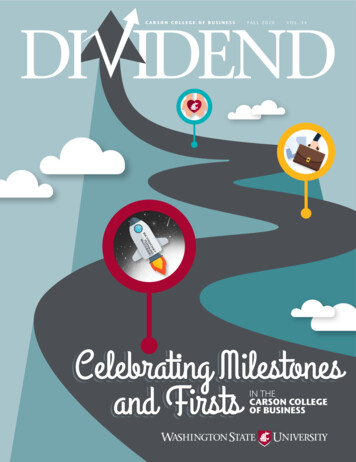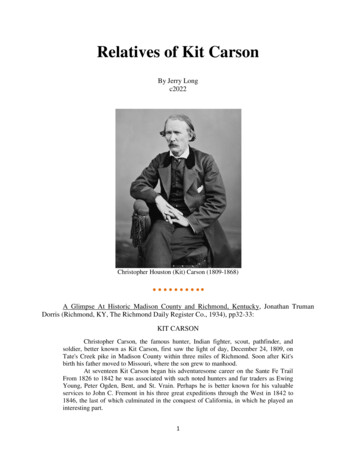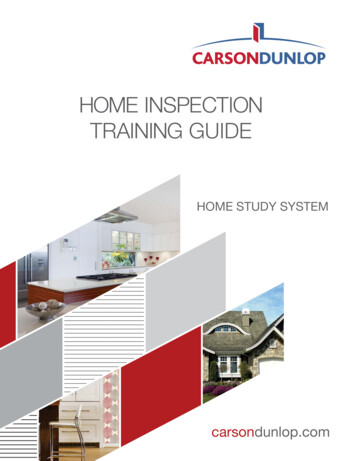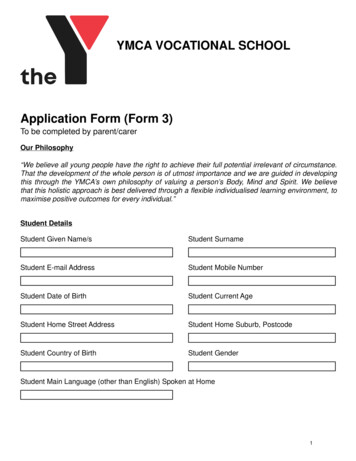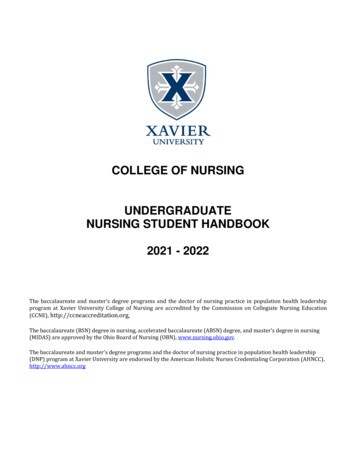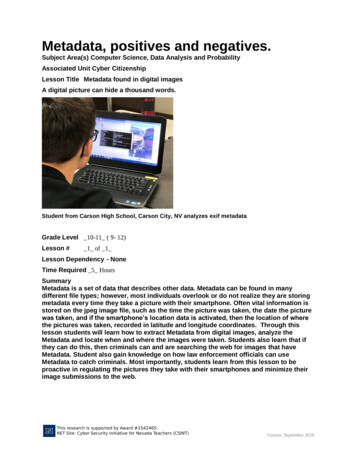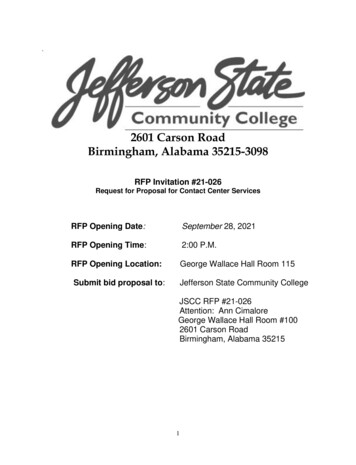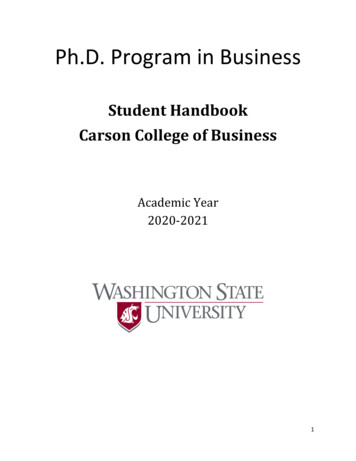
Transcription
Ph.D. Program in BusinessStudent HandbookCarson College of BusinessAcademic Year2020-20211
Table of Contents1Welcome .3Introduction 42 CCB Ph.D. Program Requirements .52.1 English Proficiency . .52.2 Program Committee .62.3 Official Program of Study 72.4 Program Requirements 72.5 Coursework Grading Standards .92.6 Independent Research Paper .92.7 Written Field Examination .102.8 Preliminary Oral Examination 112.9 Dissertation Committee 122.10 Dissertation Proposal Defense .132.11 Final Dissertation Oral Examination .132.12 CCB Ph.D. Program Normal Progress .153 Ph.D. Student Evaluation Policy 163.1 WSU Graduate School Evaluation Policy .163.2 CCB Ph.D. Programs Evaluation Policy 173.3 Dismissal from the Program .184 Ph.D. Student Appeal Process .194.1 Individual Classes and Seminars .194.2 Program Requirements and Deadlines .195 Assistantship Appointments 215.1 Assignments and Hours 215.2 Teaching Requirements 215.3 Assistantship Performance .226 Major Area Program Requirements .23Accounting 23Finance 27Hospitality and Tourism Management .30Information Systems .34Management .38Marketing .48Operations and Management Science .53Appendix A:Independent Research Paper Approval Form .56Appendix B:Written Field Examination Approval Form 57Appendix C:Dissertation Proposal Approval Form .59Appendix D:Ph.D. Student Annual Evaluation Form .60Appendix E:Academic Integrity .622
WELCOME MESSAGE FROM THE PROGRAM DIRECTORWelcome to the Carson College of Business, Washington State University Doctoral Program in Business!The mission of the Ph.D. Program in Business is provide rigorous intellectual training, combined withcomprehensive teaching experiences, that prepare students for successful academic careers. Toaccomplish our mission, the doctoral program fosters research excellence based on closestudent/professor partnerships. Faculty and students work in mentoring relationships so that Ph.D.students develop the necessary skills to identify and conduct research that extends knowledge within thefield of business. Faculty also mentor Ph.D. students to develop their teaching expertise as studentsprogress from duties as a teaching assistant to the independent teaching of undergraduate courses.Doctoral education in the Carson College of Business is both exciting and a significant intellectualchallenge. The Ph.D. Program demands intensive efforts to master the extensive knowledge base in eachstudent’s chosen area. In addition, students must become proficient in the quantitative and/or qualitativeanalysis techniques and general scientific research methodology necessary to conduct groundbreakingresearch. However, a Ph.D. program is much more than coursework. During their studies, students alsotake on other professional activities such as presenting papers at professional meetings, reviewing paperssubmitted to meetings and journals, and submitting research to academic journals.We offer doctoral education in seven major areas: Accounting, Finance, Hospitality and TourismManagement, Information Systems, Management, Marketing, and Operations and Management Science.Students in these areas may also focus their studies on interdisciplinary specializations such asEntrepreneurship and International Business. Graduates of our doctoral program go on to become facultymembers at major universities throughout the world.Organizationally, our doctoral areas of specialization are located in four Departments and one School inthe Carson College of Business. Ph.D. students report to their respective Department Chair or SchoolDirector for their Graduate Assistant duties. Staff members from each of these units coordinate officespace assignments and logistical support.The initial contact for advice regarding Ph.D. coursework and other academic guidance is the Ph.D. AreaCoordinator: Accounting—Professor Bernard Wong-On-Wing; Finance—Professor George Jiang;Hospitality and Tourism Management—Professor Jenny Kim; Information Systems—Professor RobertCrossler; Management—Professor Arvin Sahaym; Marketing—Professor Betsy Howlett; and Operationsand Management Science—Professor Chuck Munson.It is my pleasure to welcome you to the Carson College of Business Ph.D. program and wish you excitinggrowth experiences during your studies.Sincerely,Chuck MunsonCarson College of Business Ph.D. Program Director3
SECTION 1. INTRODUCTIONThe Doctor of Philosophy program in Business Administration at Washington State University prepares itsgraduates for careers in teaching and research positions at research oriented colleges and universities.The Ph.D. program is an intensive program of coursework, research, and intellectual interaction withfaculty and other students that will prepare graduates for careers as academic teachers and researchers.The program requirements are sufficiently flexible to allow the student to pursue an individual course ofstudy tailored to his or her research and teaching interests. Students work closely with individual facultymembers and are actively involved in joint research and publication projects throughout the program.Extensive course work in research methodology and statistics is included in the program. This experience,along with courses and seminars in the major field of study and supporting fields, allows an in-depthspecialization in any of the functional areas of business. This coursework coupled with individualizedtraining in research through interaction with the research faculty and other students is aimed atdeveloping the research skills of the student. Included in the program are a formal research paper and adissertation that will provide extensive research experience. The goal of the program is to develop andtrain competent scholars and teachers who will be prepared to contribute to the body of knowledge intheir chosen field and communicate this knowledge to others.The program is designed to be completed in four or five years of full time residence study, includingsummers. The purpose of a potential fifth year is to allow students to have additional time to completeresearch projects that strengthen their academic records and enhance their ability to attain academicpositions.Chapter 8 of the Graduate School Policies and Procedures Manual provides detailed descriptions of theuniversity policies and procedures that pertain to the Ph.D. program. It is the student’s responsibility tofamiliarize himself or herself with the contents of this document.The Graduate School Policies and Procedures manual is available for download online at the GraduateSchool web page: http://www.gradsch.wsu.edu/. Information on WSU Ph.D. program requirements,timelines and graduate school forms can be found at 8-2/.4
SECTION 2. CCB PH.D. PROGRAM REQUIREMENTSYou will focus on achieving four learning goals as you earn your Ph.D.Goal 1: Students will acquire a comprehensive knowledge of theory and methods used in their chosenfield and related disciplines.Goal 2: Students will produce quality research.Goal 3: Students will communicate their research clearly and professionally in both written and oral forms.Goal 4: Students will teach college courses effectively.As a student progresses through the program, he or she is evaluated in a number of ways. Each calendaryear the departmental or academic area faculty will prepare a formal evaluation of the student’s progressand performance. In addition to these annual evaluations, there are a number of critical milestones thatmust be met by the student:CourseworkIndependent Research PaperWritten Field and Preliminary Oral ExamsDissertation ProposalDissertation DefenseThe Doctoral Program Policy Committee (DPPC) enforces these requirements. The DPPC is a facultycommittee charged with the responsibility of overseeing the conduct of the business Ph.D. program in theCarson College of Business. Any exceptions to the policies and procedures, or extension of deadlines,outlined in this document, unless otherwise stated, must be formally petitioned by the academicdepartment, or academic area, and officially approved by the DPPC. The DPPC will then forward itsrecommendation to CCB Ph.D. Program Office, and, where appropriate, to the WSU Graduate School forfinal approval.Students must meet all WSU, CCB and academic area requirements. Each department or academic areamay have additional course and program requirements that may exceed those spelled out below. Forexample, some departments may require a first year core exam for continuation in the Ph.D. program.Students are expected to familiarize themselves with their individual program area requirements.Students typically graduate under the degree requirements in effect at the time they first enroll in thePh.D. program. In the event that the degree requirements affecting students are modified, each studenthas the option of changing to the new requirements; however, the student must select either the old ornew provisions in their entirety.2.1 ENGLISH PROFICIENCYEach international student, on assistantship appointment, who is from a country where English is not thenative language, must pass, at level 1 or level 2, the International Teaching Assistant (ITA) Exam giventhrough the Office of International Programs. He or she must do so before the end of the second semester5
in the program to be eligible to retain his or her assistantship. Upon completion of this requirement, acopy of the test report will be sent to the CCB Ph.D. Program Office for inclusion in the student’s file. TheITA Exam score of Level 1 approves the student to teach all levels of classes, while Level 2 approves theteaching of upper level (junior and senior) classes. The scale ranges from Level 1 to Level 5. The purposeof this requirement is to ensure that those students who will have contact with undergraduate studentshave sufficient communication skills to function in the classroom. In most cases, students who have thisrequirement are expected to take the exam during their first semester. In all cases, a student must havetaken the exam prior to being assigned teaching-related duties that required significant interaction withundergraduate students. Students who do not pass at Level 1 are recommended to take the AccentReduction course.2.2 PROGRAM COMMITTEEThe major department, or academic area, at the student’s initial enrollment to assist in his or her initialcourse selection and program planning, will appoint a temporary advisor. The Graduate School requiresstudents to form a program committee no later than their third semester in the program; thus, studentsare encouraged to solicit faculty members to serve on their program committee by the end of their firstyear.When forming a program committee, Graduate School procedures should be followed and theappropriate forms signed and filed with the CCB Ph.D. Program Office. The responsibility and prerogativeto choose a faculty member to serve as the student’s Ph.D. committee chairperson, and individualcommittee members, rests with the student and requires the concurrence of the faculty membersconcerned. It is in the best interest of the student to identify faculty members to serve in this capacity,and to establish good working relationships, early in his or her Ph.D. program.The student’s committee chair and committee members must be members of the CCB graduate faculty,and should generally represent the major field area in which the student plans to specialize. The makeupof the student’s Ph.D. committee is jointly formed on agreement between the student and his or hercommittee chairperson. The committee must include at least two additional graduate faculty members.Committee members from outside the CCB are limited to those faculty members who meet the CCBgraduate faculty qualifications or who have been approved to serve in accordance with the CCB Ph.D.Bylaws. This qualification must be met prior to appointing an outside member to the committee.This committee has the responsibility of approving the student’s program of study and directing thestudent’s progress. A list of qualified graduate faculty for the Ph.D. program can be obtained from the CCBPh.D. Programs Office.Members of a student’s program committee may or may not continue on as the dissertation committee.Students may make changes in their program committee as their research interests evolve. A detaileddescription of the university policies and procedures that pertain to the Ph.D. program committee maybe found in Chapter 8 of the Graduate School Policies and Procedures Manual.6
2.3 OFFICIAL PROGRAM OF STUDYThe official program of study is developed by the student in consultation with the program committeeand the academic area’s Ph.D. program coordinator. Courses are selected based on student’s priorpreparation, recommendation of faculty members and the student’s intended area of research.A formal program should be developed that specifies, semester by semester, which courses and researchcredits are to be taken. This official program plan must fulfill the requirements for a Ph.D. in businessadministration and be approved by each member of the student’s Ph.D. committee and the Ph.D. ProgramDirector.The program of study should be prepared and submitted by the Ph.D. student on forms provided by theGraduate School and a supplemental work sheet provided by CCB’s Ph.D. Program Office at the end ofthe first year of the student’s enrollment in the Ph.D. program. More information on the universitypolicies and procedures that pertain to the Ph.D. program of study may be found in Chapter 8 of theGraduate School Policies and Procedures Manual. Students must meet the guidelines for gradingstandards in all graded coursework in their approved program requirements.A total of 72 credit hours, of which 36 credits must be graded coursework, are required for the Ph.D.program in business. A maximum of 12 credit hours may be transferred from other universities or fromother WSU graduate programs with the approval of the student’s committee. In unusual circumstances,additional coursework, up to the limits defined by the Graduate School, may be transferred with theapproval of the committee, academic area coordinator, and the Director of the Ph.D. program.2.4 PROGRAM REQUIREMENTSP H .D. F OUNDATION R EQUIREMENTSEntering Ph.D. students must have received a baccalaureate and/or a master’s degree (M.B.A., M.S., orM.A.) from an accredited college or university or take sufficient courses after they enter the Ph.D. programto achieve a satisfactory foundation in business. Each student’s basic business preparation and need tocomplete additional foundation courses will be determined at the time of their admission by the CCB Ph.D.Program Office in consultation with the major area faculty.A basic competence level in finite math, calculus, computer usage, and statistics is required of all students.Additional prerequisite requirements may be noted, by area, in its individual Ph.D. program descriptions.The following coursework is required if a basic foundation in business has not already been established:*Operations Management .Survey of Marketing .Survey of Accounting .Financial Management .Managerial Economics .MGMT 340Mktg 360Acctg 230 & 231Fin 325EconS 305*Specific foundation courses may be waived if recommended by the major area Ph.D. coordinator and approved bythe Ph.D. Program Director.7
T OTAL C REDITSStudents must earn 72 credits to graduate. They must take at least 36 credits of graded coursework plusadditional coursework (either graded or pass/fail) to reach a total of 40 course credits. Additional research(800) credits may be taken to reach the total of 72.P H .D. P ROFESSIONAL D EVELOPMENT S EMINAR (1 CREDIT )New Ph.D. students are expected take the Carson College of Business Professional Development seminarin their first spring semester. This course is graded on a satisfactory/fail (S/F) basis.P H D T EACHING C OURSE (3 CREDITS )All Ph.D. students are expected to take the course BA 596—Doctoral Topics (Seminar in ManagementTeaching). Ideally, this course is taken in the fall semester of the second year in the program, before thestudent has full course responsibility for teaching a class.P H .D. R ESEARCH T OOL R EQUIREMENTS ( MINIMUM OF 12 CREDITS )Normal preparation in the core concepts and research methodology underlying a Ph.D. in BusinessAdministration requires a minimum of twelve (12) credit hours (more may be required by departments).Only graded coursework approved for graduate credit can apply, and specific required courses are to bedesignated and approved by each student’s Ph.D. committee within the guidelines established by eachdepartment/academic area.P H .D. M AJOR F IELD R EQUIREMENTS ( MINIMUM OF 15 CREDITS )Program requirements in this area develop proficiency in the student’s major field of study. A minimumof fifteen (15) credit hours of graduate-level graded coursework must be designated and approved by thestudent’s Ph.D. committee to fulfill the requirements. The major field requirements must include at leastsix (6) credit hours of doctoral seminar from the identified major academic area.A DDITIONAL P H .D. C OURSEWORK (M INIMUM OF 9 C REDITS )A minimum of nine (9) additional credit hours of coursework approved for graduate credit must bedesignated and approved by the student’s Ph.D. committee. Up to three (3) of these credits may be takenon a satisfactory/fail (S/F) basis.8
P H .D. R ESEARCH C REDIT R EQUIREMENTSIn addition to the research tool and field requirements, the Ph.D. in Business requires additional researchcredits in the preparation and development of the final dissertation.ACCTG 800/FIN 800/HBM 800/MGMT 800/MGTOP 800/MIS 800/MKTG 800 Doctoral Research,Dissertation, and/or Examination V 1–18 May be repeated for credit. Couse Prerequisite: Admittedto the Business Administration PhD program. Independent research and advanced study forstudents working on their doctoral research, dissertation and/or final examination. Students musthave graduate degree-seeking status and should check with their major advisor/committee chairbefore enrolling for 800 credit. S, U grading.RequirementsPh.D. students must enroll in at least one credit of 800 during every semester in which they are enrolledfull time. Passing is necessary to achieve satisfactory evaluations for research on the annual review andto remain in good standing. An unsatisfactory grade in two courses of any type, including onesrepresented by 800-level credits, represents grounds for dismissal from the program.The following minimum standards must be met to earn a satisfactory (S) grade: Present and actively participate in one college-level peer presentation session. During these 90-minutesessions, students from a variety of programs and a variety of seniority levels present to each other forapproximately 20 minutes each, and students provide feedback to each other focusing on oralpresentation effectiveness (as opposed to research content). Early-stage students can present otherpublished work if their own research is not advanced enough to present yet. Regularly participate in department research events such as research seminars. Actively engage in doctoral program events or tasks at the department and college level as they arise. Do not commit violations of academic integrity or standards of conduct as described by WSU’s Center forCommunity Standards. Meet any research targets specified at the beginning of the semester (within two weeks of the first day ofclasses). Any such goals must be expressed in writing and signed by both the student and the program’sPh.D. Faculty Coordinator. Examples could include, but are not limited to, completing a second-year paperthat meets standards, submitting a paper to a journal, completing a certain section or sections of a paper,collecting data for a research study, completing the data analysis of a research study, presenting a paperfor the department or at a professional conference, or learning a new software package.The Faculty Coordinator, in consultation with the student’s chair, has ultimate authority to assign thegrade for every student in his or her program. Furthermore, the grade for the 800 classes should not betied to performance on written comprehensive, oral preliminary, or oral final examinations. Thoseactivities have their own separate evaluation mechanisms.9
2.5 COURSEWORK GRADING STANDARDSAssigned course grades generally indicate how well a student is doing in the program. The followinginterpretation of grades may be helpful: A 4.0, A– 3.7, B 3.3, B 3.0, B– 2.7, C 2.3.Incomplete (“I”) grades are strongly discouraged and in all cases must be completed by the end of thefollowing semester to renew appointment.For continuation in the Ph.D. program and for reappointment as a graduate assistant (G.A.), each studentis required to maintain a cumulative GPA of at least 3.25 in all graded coursework in their approvedprogram. Should a student's cumulative GPA drop below a 3.25, but above the Graduate School’sminimum requirement of 3.00, the student will be placed on probation and will have one semester toraise his or her cumulative GPA to 3.25 or above. Students who are placed on probation must submit aplan for the correction of the grade deficiency. It will be developed in consultation with the departmentchair, Ph. D. area coordinator, and the student’s program committee. The plan should include specificcourses and the expected level of performance.Under normal circumstances, a student will only be allowed one semester on probation. Students alsomay not receive a grade below "B" ("B-" or lower) in three or more courses.University policies state that the enrollment of a student will be terminated should a student’s cumulativeGPA fall below a 3.00 during any semester, after the first semester. A petition, approved by thedepartment chair and the DPPC, must be filed with the Dean of the Graduate School in order to reinstatea student. A detailed description of the university’s cumulative GPA requirements for graduate studentsmay be found in Chapter 6 of the Graduate School Policies and Procedures Manual.2.6 INDEPENDENT RESEARCH PAPER (SECOND-YEAR PAPER)Each student must complete a substantial research paper, typically during the second year of coursework.The student should select a reading committee chaired by a faculty member who is a member of the CCBgraduate faculty. A second committee member must also meet the CCB Masters-Level Teaching academicqualifications, but he or she may be from a minor or supporting area.The student chooses the research topic in consultation with faculty members in his or her area of interest.The purpose of the paper is to provide the student with an opportunity to work with faculty members onresearch, provide experience as preparation for the dissertation, and to develop a publication record priorto entering the job market. The finished paper should be of sufficient scope and quality to be publishablein a respected journal or conference proceeding in the student’s area.It is expected that students will start the paper by the beginning of the fourth semester (varies by area)and present it to the area in a formal presentation by the end of the fourth or fifth semester (varies byarea). In all cases, students must have presented their paper no later than the end of the sixth semester.After approval, the form shown in Appendix A could be submitted to the CCB Ph.D. Program Office.10
2.7 WRITTEN FIELD EXAMINATIONEach student must take and pass a Written Field Exam in the student’s area of concentration. The majorarea faculty and the program committees of the students taking the field exam are responsible for thepreparation and administration of the exam. The exam is NOT part of the Graduate School’s preliminaryexam and should not be scheduled through the Graduate School.It is expected that the student will take the Written Field Exam sometime during the third year of study.The Written Field Examination should be scheduled after the completion of substantially all programcoursework. The exam must be scheduled during the Fall or Spring semester between August 15th andMay 15th. The written exam may not be scheduled during the summer without written permission fromthe area coordinator and the department. Students should have passed the Written Field Exam prior tothe end of the seventh semester.The field exam is intended to evaluate the progress of each Ph.D. student as a scholar and researcher inhis or her chosen area of study. It is intended to test the breadth and depth of the student’s knowledgeof the literature and ability to integrate the concepts, theories, models and practice in the major andsupporting areas of study. It will also address the ability of the student to apply methodological andanalytical tools to research problems in these fields.In addition to the material covered in courses and seminars, students are responsible for the body of workand literature, and emerging streams of research, in their major and supporting areas. Students shoulddiscuss preparation for the exam with their program committee and all faculty members in the majoracademic area.Field exam grades generally give an indication of a student’s proficiency level in his or her major field ofstudy and supporting areas. The Written Exam Assessment Form (see Appendix B) may be used todocument and summarize student performance using the grading standard shown below:4321Pass: Pass with DistinctionPass: Satisfactory PerformancePass: Conditional Pass - Remedial Work RecommendedFail: Unsatisfactory Performance – If 1st attempt, allow 2nd WrittenField Exam; If 2nd attempt, result is fail 1 Fail: Do not allow a 2nd Written Field ExamThe student’s Ph.D. committee and the Ph.D. academic area coordinator will assign an overall grade tothe exam. This grade must be communicated to the CCB Ph.D. Program Office and the student no laterthan three weeks after the exam. This overall grade will be based on the grading of the individual scoresby faculty who grade each question. Students are encouraged to discuss their exam performance witheach faculty member who participated in the examination process.A score over “3” on the overall grade is considered a passing grade on the examination. The student maythen schedule the Preliminary Oral Exam after consultation with the program committee.11
A score between "2" and “3” on the overall grade is a marginal pass and will likely require additionalreadings or assignments for the student prior to the scheduling of the Preliminary Oral Examination. Suchadditional requirements are to be determined by the program committee.A score below “2” but above "1" is a fail, but the committee and academic area faculty will recommendspecific areas of study for the student and allow the scheduling of a second exam after 3 months. While astudent may have had an acceptable level of performance on some topics and/or questions, the secondexam may contain some topics from the first exam, and different questions tapping what faculty judge tobe relevant topics. The academic area faculty, and the student’s program committee will determine thecontent of a second Written Field Exam. An unacceptable performance on the 2nd Written Field Exam (i.e.,a score below 2) will result in the student being ineligible for continued enrollment.A score below “1” is a failure without an option to take a second exam and results in the student beingineligible for continued enrollment.Students should discuss their performance on the exam and content of the second attempt with theirprogram committee, the Ph.D. coordinator and any other faculty member in the major area whoparticipated in the grading of the exam.2.8 PRELIMINARY ORAL EXAMINATIONThe Preliminary Oral Examination is to be taken after the Written Field Examination and may not bescheduled until the Written Field Examination has been passed. The Preliminary Oral Exam must bescheduled with the Graduate School at least 10 working days before the examination is held.Scheduling an exam requires the signature of the CCB Ph.D. Program Director. After completing thescheduling from with signatures from the student’s Ph.D. committee, the form should be turned intothe CCB Ph.D. Program Office for processing. That office will obtain the necessary signature and forwardto the WSU Grad
Welcome to the Carson College of Business, Washington State University Doctoral Program in Business! The mission of the Ph.D. Program in Business is provide rigorous intellectual training, combined with comprehensive teaching experiences, that prepare students for successful academic careers. To accomplish our mission, the doctoral program .
